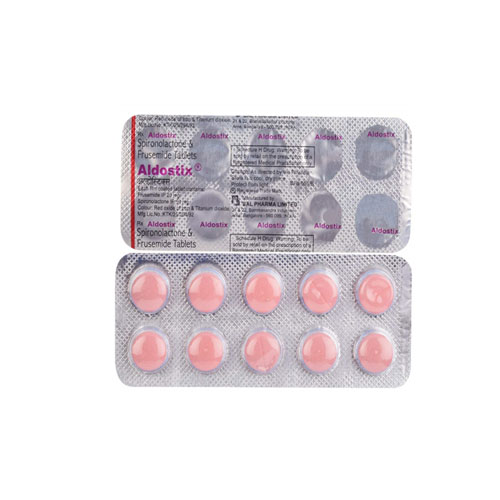Description
ALDOSTIX is a combination of Spironolactone and Frusemide which belongs to the group of medicines called Diuretics. It helps to reduce fluid build-up (edema) in the body. Edema is a type of swelling or puffiness of body parts caused due to excessive accumulation of fluid (water) in the body. These extra fluids can cause swollen ankles, shortness of breath and can make you feel more tired than usual. It can also put extra strain on your heart, blood vessels, lungs, kidneys, or liver.
Spironolactone is a potassium sparing diuretic and frusemide is a loop diuretic. They act by removing the excess water and certain electrolytes (sodium and chloride) from the body in the form of urine. Unlike other diuretics, ALDOSTIX retains potassium in the body which prevents the risk of developing hypokalaemia (low blood potassium levels).
Before taking ALDOSTIX inform your doctor if you have any liver, kidney, or heart problems. You must also inform your doctor if you are severely dehydrated or have diabetes, gout, prostate problems, or low blood pressure which makes you feel dizzy while standing up or changing position.
During management with ALDOSTIX, avoid consuming potassium rich diet or potassium supplements, as it may further increase the levels of potassium in your body.
ALDOSTIX is not recommended for use in patients with severe low sodium levels in their blood. It is also not suitable for use in pregnant or breastfeeding women due to increased risk of side effects.
ALDOSTIX may alters the levels of electrolytes in your body and may make you feel dizzy or tired very easily. To avoid this, your doctor would closely monitor your serum electrolyte levels and increase or decrease the dose of ALDOSTIX accordingly.
The most common side effects of [GBKEYWORD] are headache, dizziness, nausea, vomiting, tiredness, muscle weakness, increased urination, or impotence. Consult your doctor if any of the side effect bothers you.
USES OF ALDOSTIX
- Manages edema (fluid retention)
HOW ALDOSTIX WORKS
ALDOSTIX acts by removing the excess water and certain electrolytes (sodium and chloride) from the body in the form of urine while simultaneously maintaining the levels of potassium in the body.
DIRECTIONS FOR USE
Take ALDOSTIX as advised by your physician. Swallow the medicine with a glass of water. Do not crush or chew the medicine. It is taken preferably with meals. Your doctor will decide the correct dose and duration of therapy for you depending upon your age, body weight and disease condition. Avoid taking ALDOSTIX at night as it could affect your sleep. Do not stop taking ALDOSTIX unless your doctor tells you to stop.
SIDE EFFECTS OF ALDOSTIX
COMMON
- headache, dizziness
- nausea, vomiting
- general weakness
- increased urination
- excessive thirst
- impotence, reduced sex drive
- breast enlargement in men
- sensation of tingling and numbness
UNCOMMON
- loss of bladder control
- loss of hearing
- leg cramps
RARE
- ringing in the ears
- inflammation of blood vessels
Stop taking ALDOSTIX and contact your doctor immediately if you experience any of the following side effects:
- signs of allergic reaction (such as skin rash, itching severe blistering of the skin around the lips, eyes, mouth, nose and genitals, skin sensitivity, fever, swollen ankles, inflammation of the kidneys, shock, cold or pale skin, difficulty in breathing, fast heartbeat)
- signs of pancreatitis (such as severe stomach pain or back pain)
- increased infections and tendency to bruise more easily, feeling weak or tired more than usual
- signs of dehydration (such as excessive thirst, feeling dizzy or light-headed, fainting, headache, confusion, joint pains, muscle weakness or spasms, stomach upsets or uneven heartbeats)
- signs of liver problems (such as yellowing of the skin or eyes, dark urine)
- feeling dizzy or faint
HOW TO MANAGE SIDE EFFECTS
Nausea and Vomiting:
Take ALDOSTIX with or just after meals. Stick to simple meals. Avoid eating oil rich or spicy foods. Consult your doctor if your nausea worsens.
Headache:
Rest and relax. Keep yourself hydrated by drinking plenty of fluids such as water or electrolytes. Applying a pain-relieving balm on your forehead can be beneficial. Do not consume excessive alcohol, as it could aggravate your headache. Consult your doctor if your headache worsens.
Dizziness:
Try to rest and relax. Get enough sleep. Avoid driving or operating any tools or machines completely if you feel dizzy. Do not consume excessive alcohol, as it could aggravate your dizziness. Consult your doctor if your dizziness worsens.






Reviews
There are no reviews yet.